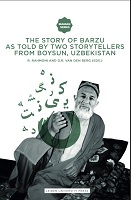The Story of Barzu
As Told by Two Storytellers from Boysun, Uzbekistan
Contributor(s)
Rahmoni, Ravshan (editor)
van den Berg, Gabrielle (editor)
Collection
Knowledge Unlatched (KU)Number
100451Language
EnglishAbstract
The ancient Persian storytelling tradition has survived until the present day among the Tajik villages in the Gissar mountains of Uzbekistan. This book explores the story of Barzu and demonstrates that the historical Transoxania, since the time of Alexander the Great, has always been a melting pot of diverse shared cultures. In the village of Pasurxi, near Boysun in the Surxandaryo region of contemporary Uzbekistan, a vivid oral tradition exists on the basis of stories from the Persian Book of Kings or Šohnoma (Shahnama), composed more than a thousand years ago by the poet Firdavsi (Ferdowsi). These stories deal with the hero Barzu. The storytellers Jura Kamol and Mullo Ravšan composed two different versions of the story of Barzu in the Tajik as spoken in the Surxandaryo region. They used to tell their stories during evening gatherings in the village.
Keywords
Literature; Story telling; Boysun; Derde; Etiquette in Indonesia; Inro; Iran; Jura; Rostam; Tajiks; UzbeksDOI
10.24415/9789087281168ISBN
9789087281168, 978400601185, 9789400600355OCN
982228281Publisher
Leiden University PressPublisher website
https://www.lup.nl/Publication date and place
Leiden, 2013Series
Iranian Studies Series,Classification
Literary studies: ancient, classical and medieval


 Download
Download